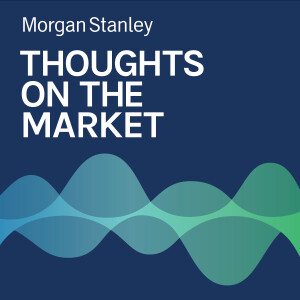
With the U.S. possibly imposing tighter trade policies towards China, investors may want to look into diversifying their investments.
----- Transcript -----
Welcome to the thoughts on the market. I'm Michael Zezas, Global Head of Fixed Income and Thematic Research for Morgan Stanley. Along with my colleagues bringing you a variety of perspectives, I'll be talking about the U.S., China relationship and its impact on markets. It's Wednesday, July 5th at noon in New York.
In recent weeks, the Biden administration has focused on the U.S. relationship with China. Treasury Secretary Yellen is headed to Beijing this week for meetings with senior officials in China, following on Secretary of State Blinken's recent visit. Whenever these diplomatic efforts pick up, investors tend to ask if it's a sign that there could be a softening or even a reversal in policy choices by the U.S. in recent years to create more rules and barriers to trade in certain higher tech industries. The interest is because these moves drove concern among many investors that multinational companies would have a harder time doing business in China in the future. But in our view, these policies are not going to reverse, but rather will likely become tighter.
Consider that the stated goal of these meetings was to open regular communication channels on economic and security issues. It's obviously important for countries to have regular communication to avoid misunderstandings spiraling into conflict. But this appears to be where the ambition for these meetings ends. There's no more talk of reaching comprehensive free trade agreements, for example.
Given that context, it makes sense that we're continuing to see news reports that the Biden administration is preparing fresh non-tariff barriers which would impact China. This includes further tightening export controls on semiconductors in an attempt by the U.S. to protect its technical advantage in an industry that's critical to both its economic and national security. It also includes long awaited outbound investment restrictions, which could crimp foreign direct investment into China.
To be clear though, none of this is the same as a hard decoupling of the U.S. and China economies, nor would it have the related shock effect on global markets. The effects here are likely to be incremental adjustments by companies over time to deal with these policies. This is why, for example, we've seen many multinationals announce their diversifying they’re supply chains by investing in new geographies like Mexico and Turkey. But for the most part, they're not pulling existing resources out of China.
Given all of that, investors may want to react to this nuanced situation by incrementally shifting international equity allocations to countries whose stock markets have solid valuations and may also benefit from companies' new supply chain investments. Japan in particular stands out to our colleagues in equity strategy, and Mexico and India also appear to be solid options longer term.
Thanks for listening. If you enjoy the show, please share Thoughts on the Market with a friend or colleague, or leave us a review on Apple Podcasts. It helps more people find the show.
More Episodes
 2024-10-11
2024-10-11
 2024-10-10
2024-10-10
 2024-10-09
2024-10-09
 2024-10-04
2024-10-04
 2024-10-03
2024-10-03
 2024-10-01
2024-10-01
 2024-09-30
2024-09-30
 2024-09-27
2024-09-27
 2024-09-25
2024-09-25
 2024-09-24
2024-09-24
 2024-09-19
2024-09-19
 2024-09-17
2024-09-17
 2024-09-16
2024-09-16
Create your
podcast in
minutes
- Full-featured podcast site
- Unlimited storage and bandwidth
- Comprehensive podcast stats
- Distribute to Apple Podcasts, Spotify, and more
- Make money with your podcast
It is Free
- Privacy Policy
- Cookie Policy
- Terms of Use
- Consent Preferences
- Copyright © 2015-2024 Podbean.com





